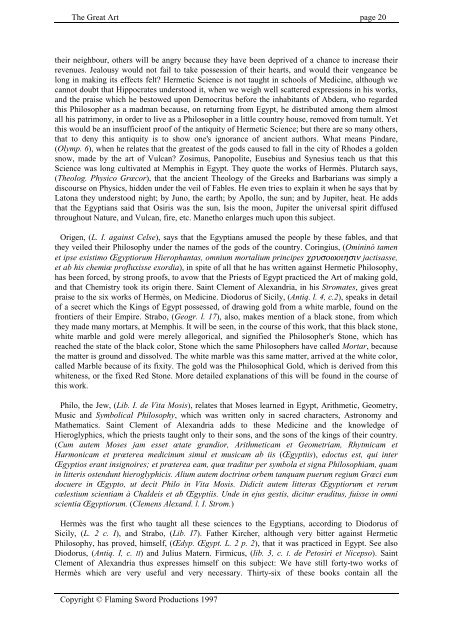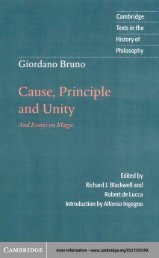The Great Art
You also want an ePaper? Increase the reach of your titles
YUMPU automatically turns print PDFs into web optimized ePapers that Google loves.
<strong>The</strong> <strong>Great</strong> <strong>Art</strong> page 20<br />
their neighbour, others will be angry because they have been deprived of a chance to increase their<br />
revenues. Jealousy would not fail to take possession of their hearts, and would their vengeance be<br />
long in making its effects felt? Hermetic Science is not taught in schools of Medicine, although we<br />
cannot doubt that Hippocrates understood it, when we weigh well scattered expressions in his works,<br />
and the praise which he bestowed upon Democritus before the inhabitants of Abdera, who regarded<br />
this Philosopher as a madman because, on returning from Egypt, he distributed among them almost<br />
all his patrimony, in order to live as a Philosopher in a little country house, removed from tumult. Yet<br />
this would be an insufficient proof of the antiquity of Hermetic Science; but there are so many others,<br />
that to deny this antiquity is to show one's ignorance of ancient authors. What means Pindare,<br />
(Olymp. 6), when he relates that the greatest of the gods caused to fall in the city of Rhodes a golden<br />
snow, made by the art of Vulcan? Zosimus, Panopolite, Eusebius and Synesius teach us that this<br />
Science was long cultivated at Memphis in Egypt. <strong>The</strong>y quote the works of Hermès. Plutarch says,<br />
(<strong>The</strong>olog. Physico Grœcor), that the ancient <strong>The</strong>ology of the Greeks and Barbarians was simply a<br />
discourse on Physics, hidden under the veil of Fables. He even tries to explain it when he says that by<br />
Latona they understood night; by Juno, the earth; by Apollo, the sun; and by Jupiter, heat. He adds<br />
that the Egyptians said that Osiris was the sun, Isis the moon, Jupiter the universal spirit diffused<br />
throughout Nature, and Vulcan, fire, etc. Manetho enlarges much upon this subject.<br />
Origen, (L. I. against Celse), says that the Egyptians amused the people by these fables, and that<br />
they veiled their Philosophy under the names of the gods of the country. Coringius, (Omininò tamen<br />
et ipse existimo Œgyptiorum Hierophantas, omnium mortalium principes χρυσοωοιησιν jactisasse,<br />
et ab his chemiœ profluxisse exordia), in spite of all that he has written against Hermetic Philosophy,<br />
has been forced, by strong proofs, to avow that the Priests of Egypt practiced the <strong>Art</strong> of making gold,<br />
and that Chemistry took its origin there. Saint Clement of Alexandria, in his Stromates, gives great<br />
praise to the six works of Hermès, on Medicine. Diodorus of Sicily, (Antiq. l. 4, c.2), speaks in detail<br />
of a secret which the Kings of Egypt possessed, of drawing gold from a white marble, found on the<br />
frontiers of their Empire. Strabo, (Geogr. l. 17), also, makes mention of a black stone, from which<br />
they made many mortars, at Memphis. It will be seen, in the course of this work, that this black stone,<br />
white marble and gold were merely allegorical, and signified the Philosopher's Stone, which has<br />
reached the state of the black color, Stone which the same Philosophers have called Mortar, because<br />
the matter is ground and dissolved. <strong>The</strong> white marble was this same matter, arrived at the white color,<br />
called Marble because of its fixity. <strong>The</strong> gold was the Philosophical Gold, which is derived from this<br />
whiteness, or the fixed Red Stone. More detailed explanations of this will be found in the course of<br />
this work.<br />
Philo, the Jew, (Lib. I. de Vita Mosis), relates that Moses learned in Egypt, Arithmetic, Geometry,<br />
Music and Symbolical Philosophy, which was written only in sacred characters, Astronomy and<br />
Mathematics. Saint Clement of Alexandria adds to these Medicine and the knowledge of<br />
Hieroglyphics, which the priests taught only to their sons, and the sons of the kings of their country.<br />
(Cum autem Moses jam esset œtate grandior, Arithmeticam et Geometriam, Rhytmicam et<br />
Harmonicam et prœterea medicinum simul et musicam ab iis (Œgyptiis), edoctus est, qui inter<br />
Œgyptios erant insignoires; et prœterea eam, quœ traditur per symbola et signa Philosophiam, quam<br />
in litteris ostendunt hieroglyphicis. Alium autem doctrinœ orbem tanquam puerum regium Grœci eum<br />
docuere in Œgypto, ut decit Philo in Vita Mosis. Didicit autem litteras Œgyptiorum et rerum<br />
cœlestium scientiam à Chaldeis et ab Œgyptiis. Unde in ejus gestis, dicitur eruditus, fuisse in omni<br />
scientia Œgyptiorum. (Clemens Alexand. l. I. Strom.)<br />
Hermès was the first who taught all these sciences to the Egyptians, according to Diodorus of<br />
Sicily, (L. 2 c. I), and Strabo, (Lib. I7). Father Kircher, although very bitter against Hermetic<br />
Philosophy, has proved, himself, (Œdyp. Œgypt. L. 2 p. 2), that it was practiced in Egypt. See also<br />
Diodorus, (Antiq. I, c. II) and Julius Matern. Firmicus, (lib. 3, c. I. de Petosiri et Nicepso). Saint<br />
Clement of Alexandria thus expresses himself on this subject: We have still forty-two works of<br />
Hermès which are very useful and very necessary. Thirty-six of these books contain all the<br />
Copyright © Flaming Sword Productions 1997

















